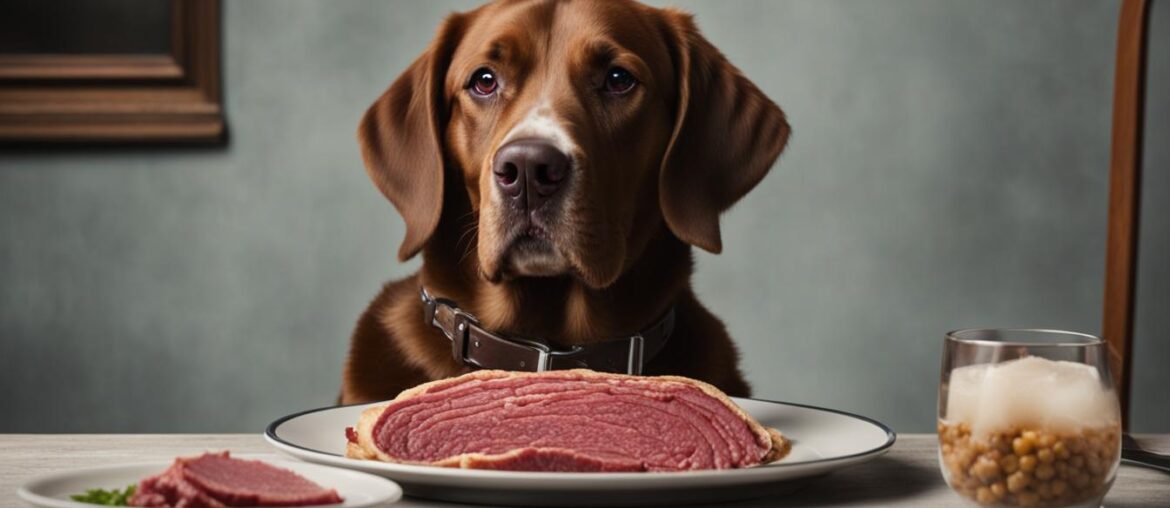In today’s article, I will address a common question that many dog owners have: Can dogs eat corned beef? As a professional in the field of veterinary medicine, I want to provide you with expert advice on whether corned beef is safe for your furry friend.
Corned beef is a popular type of preserved meat that is commonly enjoyed by humans, especially on St. Patrick’s Day. However, when it comes to our canine companions, the situation is quite different. While corned beef may be a delicious treat for us, it can pose serious health risks to dogs.
Feeding corned beef to dogs is not recommended due to its high salt and fat content. Consuming this type of meat can lead to salt poisoning and gastrointestinal problems in dogs. Additionally, the curing process and added seasonings in corned beef can cause digestive issues and food poisoning.
I understand that it can be tempting to share our food with our furry friends, but when it comes to their health and well-being, it’s important to prioritize their specific dietary needs. To ensure their safety, it is best to avoid feeding corned beef to dogs altogether and opt for healthier alternatives.
Next, we will explore in detail why corned beef is harmful to dogs and the potential health risks associated with its consumption.
Key Takeaways:
- Corned beef is not safe for dogs to consume due to its high salt and fat content.
- Feeding corned beef to dogs can lead to salt poisoning, gastrointestinal problems, and food poisoning.
- The curing process and added seasonings in corned beef can cause digestive issues in dogs.
- It is best to avoid feeding corned beef to dogs and opt for healthier alternatives.
- Consult with a veterinarian for advice on suitable food choices for your dog.
Why Corned Beef is Harmful to Dogs
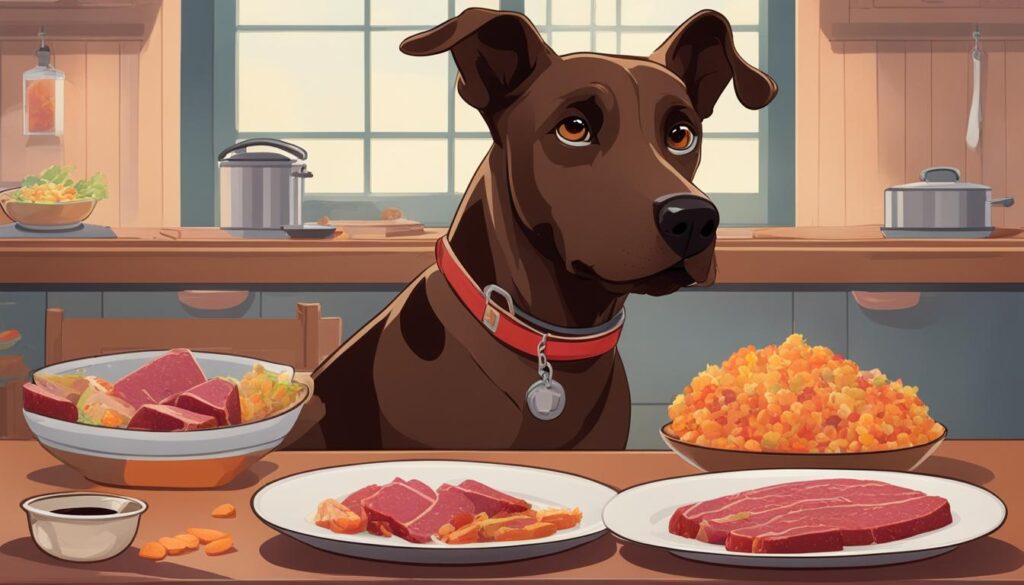
Corned beef, despite its popularity among humans, is not suitable for canine consumption. Dogs have different dietary needs compared to humans, and feeding them corned beef can have detrimental effects on their health. Here’s why:
High Levels of Salt and Fat: Corned beef contains excessive amounts of salt and fat, which can lead to health problems in dogs. Consuming high-sodium foods like corned beef can put dogs at risk of salt poisoning, causing symptoms such as vomiting, diarrhea, excessive thirst, and increased heart rate.
Curing Process and Seasonings: The curing process involved in making corned beef often introduces additional salts and preservatives that can be harmful to dogs. Moreover, the seasonings used in corned beef, such as garlic and spices, are known to be toxic to dogs. These ingredients can cause digestive issues and even more severe health complications.
Dogs have different nutritional requirements than humans, and their diets should primarily consist of balanced, dog-specific foods. Corned beef lacks the essential nutrients that dogs need for overall well-being and should be avoided to ensure their health and safety.
| Nutrient | Corned Beef (per 100g) | Dog’s Daily Requirement |
|---|---|---|
| Protein | 15g | Varies by breed and size |
| Fat | 19g | Varies by breed and size |
| Sodium | 1188mg | Less than 100mg |
| Vitamin C | 0mg | Varies by breed and size |
As seen in the table above, corned beef contains high levels of fat, sodium, and lacks essential vitamins needed for a healthy canine diet. These imbalances can disrupt a dog’s nutritional intake and potentially lead to various health issues over time.
Expert Advice: Opt for Safer Alternatives
To ensure your dog’s well-being, it’s best to avoid feeding them corned beef and opt for safer alternatives that provide balanced nutrition. Lean cuts of unseasoned and cooked beef can be a suitable option in moderation. Additionally, there are commercially available dog-specific foods and treats that are formulated to meet all of your dog’s nutritional needs.
Feeding your dog a properly balanced diet is essential for their overall health and longevity. Consult with your veterinarian to determine the most appropriate dietary plan for your dog’s specific needs and ensure their well-being.
Potential Health Risks from Corned Beef
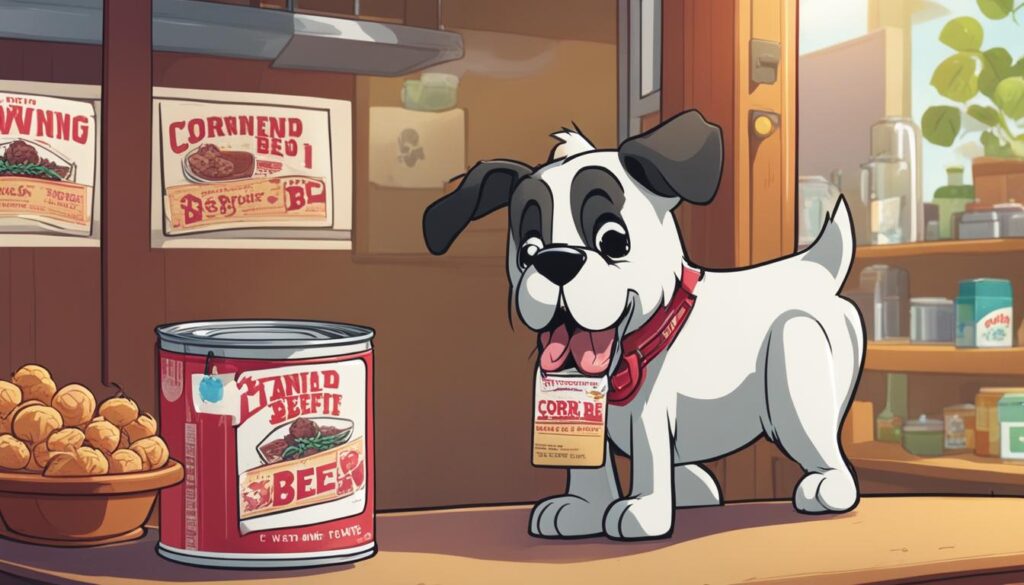
Consuming corned beef can expose dogs to various health risks, including gut and digestive issues. Overconsumption of corned beef can lead to acute salt poisoning, resulting in symptoms such as vomiting, diarrhea, increased heart rate, and even kidney failure. Dogs can also experience gastrointestinal problems like gastroenteritis and pancreatitis as a result of consuming corned beef.
One of the significant dangers of corned beef for dogs is its high salt content. Dogs are more sensitive to salt than humans, and excessive salt intake can have severe consequences for their health. Salt poisoning in dogs can lead to dehydration, electrolyte imbalances, and damage to vital organs.
Additionally, the curing process and seasonings used in corned beef can cause digestive issues in dogs. The ingredients and spices in corned beef can irritate the dog’s digestive system, leading to stomach upset, gas, and bloating. This can result in discomfort and possible long-term damage to the intestines.
Gastrointestinal problems like gastroenteritis, which is inflammation of the stomach and intestines, can occur when dogs consume corned beef. Symptoms include vomiting, diarrhea, abdominal pain, and loss of appetite. Corned beef can also trigger pancreatitis, which is inflammation of the pancreas. Pancreatitis can cause severe abdominal pain, vomiting, diarrhea, and general discomfort.
It is crucial to be aware of the potential health risks associated with feeding corned beef to dogs. Monitoring their diet and ensuring they consume foods that are safe and beneficial for their digestive system is essential for their overall well-being.
Potential Health Risks of Corned Beef for Dogs
| Health Risks | Symptoms |
|---|---|
| Salt Poisoning | Vomiting, diarrhea, increased heart rate, kidney failure |
| Gastrointestinal Issues | Gastroenteritis, pancreatitis, stomach upset, gas, bloating |
| Dehydration | Increased thirst, electrolyte imbalances |
| Damage to Vital Organs | Kidney damage, liver damage |
It is crucial to prioritize the health of our canine companions by providing them with a balanced and safe diet. While corned beef may be a tasty treat for humans, it is best to avoid feeding it to dogs due to the potential health risks it poses. Instead, opt for dog-friendly foods that are specifically formulated to meet their nutritional needs and promote good digestive health.
Dangers of Packaging and Seasonings

When it comes to feeding corned beef to dogs, the hazards go beyond the meat itself. The packaging and seasonings used in corned beef can pose serious risks to our furry friends.
Dogs may accidentally ingest non-digestible packaging materials, such as plastic or metal, while consuming corned beef. This can lead to potential blockages in their digestive systems, causing discomfort, pain, and even the need for surgical intervention. It is crucial to ensure that any packaging surrounding the corned beef is removed and properly disposed of to prevent accidental ingestion by dogs.
Furthermore, the sharp edges of opened cans can cause cuts and injuries to a dog’s gums and tongue. These injuries can be painful and may require veterinary attention. To avoid such incidents, it is important to handle opened cans of corned beef with caution and dispose of them properly.
Another danger lies in the seasonings added to corned beef. While they may enhance the flavor for human consumption, some of these seasonings can be toxic to dogs. Spices like garlic and onions, commonly used in corned beef, can be harmful and potentially cause adverse reactions in dogs. It’s important to note that even small amounts of these seasonings can have detrimental effects on our canine companions. Therefore, it is best to steer clear of feeding corned beef, or any seasoned meat, to dogs.
The Hazards of Corned Beef Packaging
When dogs consume corned beef, there is a risk of ingesting non-digestible packaging materials that can lead to blockages in their gut. It is crucial to remove all packaging before feeding corned beef to dogs to prevent any accidental ingestion and potential harm.
The Dangers of Seasonings in Corned Beef
Seasonings like spices and garlic, commonly found in corned beef, can be toxic to dogs even in small amounts. Feeding dogs corned beef can expose them to these harmful seasonings and put their health at risk. It is safer to opt for dog-specific foods that are formulated to meet their nutritional needs.
Symptoms and Effects of Corned Beef Consumption in Dogs

Dogs who consume corned beef may experience various symptoms and effects. It is essential to understand the potential health risks associated with corned beef consumption in dogs and be able to recognize the signs of illness.
Symptoms
Symptoms of corned beef consumption in dogs can vary depending on factors such as their size, overall health, and the quantity of corned beef ingested. Common symptoms may include:
- Vomiting
- Diarrhea
- Lethargy
- Increased thirst
- Muscle weakness
- Difficulty walking properly
In severe cases, the ingestion of corned beef can lead to more serious symptoms, such as seizures, coma, and even death. It is crucial to monitor your dog closely after they have consumed corned beef and seek veterinary attention if any concerning symptoms occur.
Effects
The effects of corned beef consumption in dogs can be detrimental to their health. Corned beef is high in salt, which can lead to salt poisoning in dogs. Excessive salt intake can cause an imbalance in electrolytes, leading to dehydration, increased thirst, and damage to the kidneys, heart, and other organs.
Furthermore, the high fat content present in corned beef can lead to gastrointestinal upset, including vomiting and diarrhea. The added seasonings and spices in corned beef can also cause digestive problems and food poisoning in dogs.
It is important to recognize the potential effects of corned beef consumption in dogs and take immediate action if any symptoms arise. Consulting a veterinarian is essential to ensure the well-being and prompt treatment of your canine companion.
| Symptoms of Corned Beef Consumption in Dogs | Potential Effects |
|---|---|
| Vomiting | Disruption of electrolyte balance, dehydration |
| Diarrhea | Gastrointestinal upset, nutrient imbalance |
| Lethargy | Sign of underlying illness, electrolyte imbalance |
| Increased thirst | Excessive salt intake, potential kidney damage |
| Muscle weakness | Electrolyte imbalance, potential organ damage |
| Difficulty walking properly | Neuromuscular abnormalities, potential seizure risk |
What to Do If Your Dog Eats Corned Beef
If your dog has eaten corned beef, it is important to take swift action to ensure their health and well-being. Here are some steps you can take:
- Contact a veterinarian: It is crucial to seek professional advice from a veterinarian as soon as you realize your dog has ingested corned beef. They will provide guidance on the best course of action based on the specific circumstances.
- Induce vomiting: If the corned beef was consumed recently and the veterinarian deems it appropriate, they may recommend inducing vomiting to remove the ingested meat from your dog’s stomach. This should only be done under professional supervision.
- Treatment options: The veterinarian may administer treatment based on your dog’s condition. This may include IV fluids to hydrate and flush toxins out of their system, medications to alleviate symptoms or prevent complications, and tests to assess kidney function and check for any obstructions.
- Monitor your dog: After the initial treatment, it is important to closely monitor your dog’s condition for any changes or complications. Observe their behavior, appetite, and bowel movements. If you notice any concerning symptoms or if they worsen, contact your veterinarian immediately.
Remember, it is crucial to consult with a veterinarian for professional advice tailored to your dog’s specific situation. They will provide the necessary guidance and treatment options to ensure the best possible outcome for your furry friend.
| Treatment Options | Description |
|---|---|
| Inducing vomiting | If the corned beef was consumed recently, the veterinarian may administer medication or use other methods to induce vomiting and remove the ingested meat from the dog’s stomach. |
| IV Fluids | To flush out toxins and hydrate the dog’s system, the veterinarian may administer intravenous fluids. This helps support the dog’s overall well-being and aids in the prevention of complications. |
| Medications | Depending on the dog’s condition, the veterinarian may prescribe medications to alleviate symptoms caused by the consumption of corned beef or prevent potential complications. |
| Monitoring and follow-up care | It is important to closely monitor the dog’s condition and behavior after treatment. Regular follow-up visits with the veterinarian may be necessary to ensure complete recovery and address any further concerns. |
Can Dogs Have Corned Beef in Small Amounts?
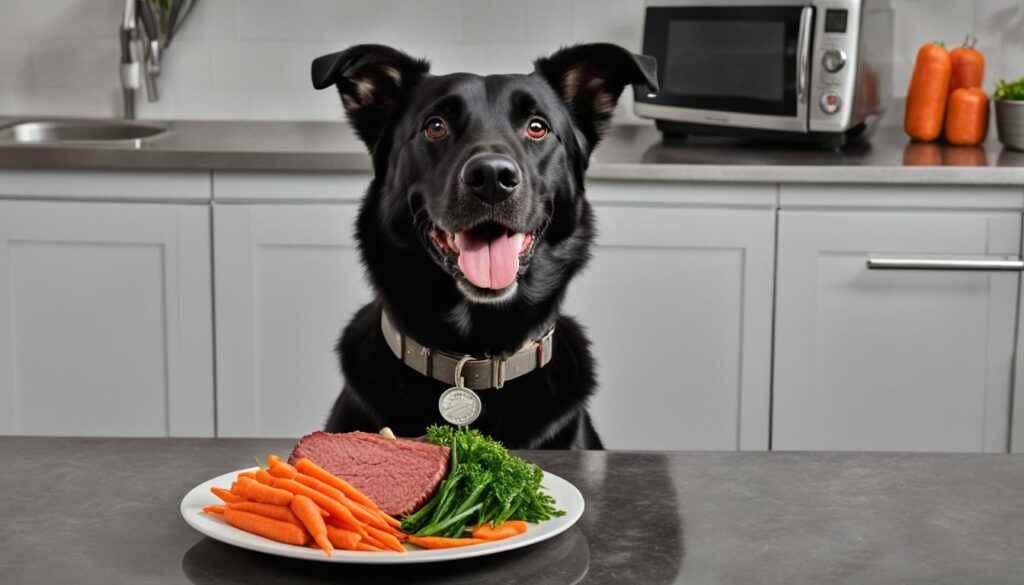
Feeding dogs small amounts of corned beef is not recommended due to the potential health risks associated with its consumption. While it may be tempting to share a bite of this savory meat with your furry friend, it’s best to avoid feeding them corned beef altogether and opt for safer alternatives that better meet their nutritional needs.
Corned beef contains high levels of salt and fat, which can be harmful to dogs, especially in excess. The salt content in corned beef can lead to salt poisoning in dogs, resulting in symptoms such as vomiting, diarrhea, increased thirst, and even kidney failure. Excessive fat consumption can also lead to digestive issues and weight gain in dogs.
Additionally, the seasoning ingredients used in corned beef, such as spices and garlic, can be toxic to dogs, causing further health complications. While moderation is often emphasized when it comes to human food and dogs, corned beef is not a suitable option due to its potential risks.
| Health Risks of Feeding Dogs Corned Beef in Small Amounts | Safe Alternatives |
|---|---|
|
|
While it may be tempting to share your favorite foods with your dog, it’s important to prioritize their health and well-being. Opting for dog-specific foods and treats that provide a balanced diet ensures that your furry friend receives the nutrients they need without exposing them to potential risks.
Safer Alternatives to Corned Beef
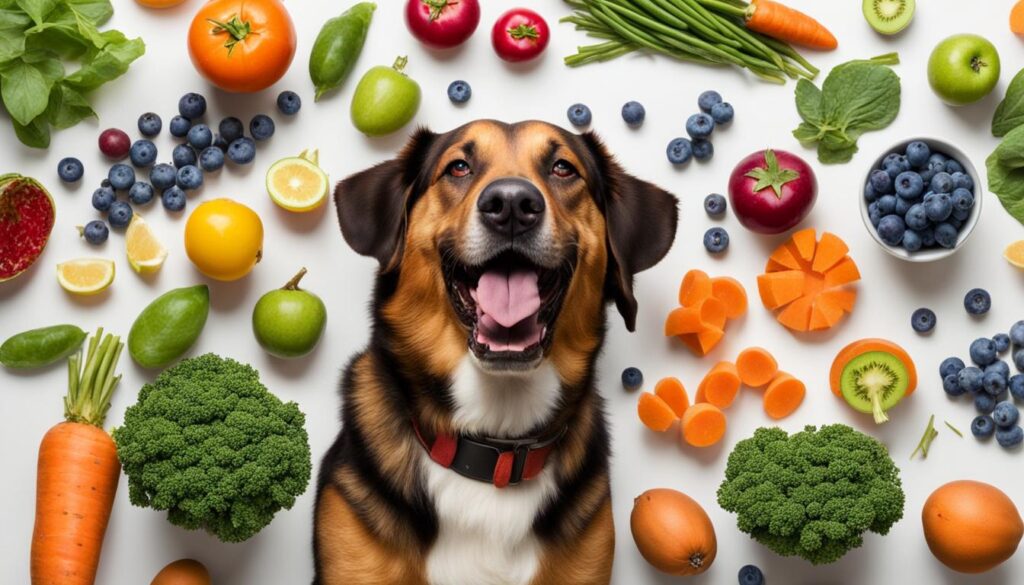
When it comes to feeding your dog, there are plenty of safe alternatives to corned beef that they can enjoy. It’s important to choose dog-friendly foods that provide the right nutrition without posing any health risks. Here are a few options to consider:
1. Lean Cuts of Beef
If you want to stick with meat, opt for lean cuts of beef without any seasonings or additives. These can be cooked thoroughly and offered to your dog in moderation. Remember to remove any bones, as they can be hazardous to dogs.
2. Commercially Available Dog-Friendly Foods
For a convenient and balanced diet, there are commercially available dog-friendly foods and treats in the market. These are specially formulated to meet dogs’ nutritional needs and come in various flavors and textures to keep your dog satisfied.
If you’re unsure about the best dog-friendly options for your pet, consulting with a veterinarian can provide valuable guidance and ensure you make the right choices.
Remember, dogs have different dietary requirements compared to humans, so it’s important to avoid feeding them foods that may be harmful to their health. Providing a balanced and species-specific diet is crucial for their overall well-being.
By choosing safe alternatives to corned beef and other human food, you can ensure that your furry friend receives the nutrition they need without putting their health at risk.
Why Dogs Should Stick to Canine-Specific Foods
When it comes to feeding our furry friends, it can be tempting to share our own meals with them. After all, who can resist those pleading eyes and wagging tails? However, it’s important to remember that dogs have different nutritional needs than humans, and their diets should primarily consist of dog-specific foods.
Dog-specific foods are specifically formulated to provide the right balance of nutrients that dogs require for optimal health. They are tailored to meet the unique dietary needs of dogs, taking into account their size, age, breed, and activity level.
Unlike human food, which may contain ingredients that are safe for us but harmful to dogs, dog-specific foods are free from potentially toxic substances. They are carefully crafted to ensure the right amount of protein, carbohydrates, fats, vitamins, and minerals that dogs need to thrive.
Feeding dogs human food, especially on a regular basis, can lead to nutritional imbalances and health issues. Certain human foods, such as chocolate, onions, grapes, and avocados, are toxic to dogs and can cause serious harm or even be fatal. Dogs also have different digestion processes, and some human foods can be difficult for them to break down and digest properly.
The Benefits of Dog-Specific Foods:
- Provide the right balance of nutrients for dogs’ specific needs
- Ensure proper digestion and nutrient absorption
- Reduce the risk of nutritional deficiencies and imbalances
- Promote healthy growth and development
- Support a strong immune system
- Help maintain a healthy weight
- Decrease the likelihood of allergies or food sensitivities
By sticking to dog-specific foods, you can have peace of mind knowing that you are providing your furry friend with the best nutrition possible. If you have any doubts about which dog food is right for your pet, consult with your veterinarian for personalized recommendations.
“Feeding dogs canine-specific foods ensures that they receive the proper nutrition they need to thrive. It’s important to remember that dogs are not small humans and have unique dietary requirements. By choosing dog-specific foods, you are prioritizing their health and well-being.”
So, the next time you’re tempted to share your plate with your pup, remember to reach for dog-specific foods instead. Your dog will thank you with a wagging tail and a healthy, happy life.
Potential Risks of Processed Meats for Dogs
Processed meats, including corned beef, can pose significant health risks for dogs. These meats are typically high in fat and salt, which can have detrimental effects on a dog’s overall well-being. Consumption of processed meats like pastrami, salami, and saucisson can result in various health issues for our furry friends. Therefore, it is crucial to avoid feeding dogs these types of meats to ensure their optimal health and longevity.
Processed meats have become increasingly popular in human diets due to their convenience and taste. However, when it comes to dogs, such meats should be strictly off-limits. The excessive fat and salt content in processed meats can lead to weight gain, obesity, and cardiovascular problems in dogs. Additionally, the preservatives and additives used in processing these meats can be harmful to a dog’s digestive system and overall health.
Effects of Processed Meats on Dogs
The effects of consuming processed meats can manifest in various ways in dogs. Some common health issues that can arise include:
- Obesity: The high fat content in processed meats can lead to weight gain and obesity in dogs.
- Heart Problems: Excess salt intake from processed meats can contribute to hypertension and heart disease.
- Digestive Issues: Dogs may experience gastrointestinal problems such as upset stomach, diarrhea, and vomiting due to the additives and preservatives in processed meats.
- Increased Risk of Cancer: Processed meats have been linked to an increased risk of certain types of cancer, such as colorectal cancer, in humans. While the research on dogs is limited, it is best to err on the side of caution and avoid feeding them these meats.
Processed meats, including corned beef, can be risky for dogs due to their high fat and salt content. Other processed meats such as pastrami, salami, and saucisson can have similar effects on dogs’ health. It is important to avoid feeding dogs these types of meats.
When it comes to caring for our dogs, it is essential to prioritize their health and well-being. Providing them with a balanced and nutritious diet that includes dog-specific foods is crucial for their overall health. By avoiding processed meats and opting for healthier alternatives, we can ensure that our canine companions lead a happy and healthy life.
Considerations when Sharing Food with Dogs
When it comes to sharing food with our canine companions, it is essential to prioritize their specific dietary needs and ensure their well-being. While it may be tempting to offer them a taste of our own meals, not all human foods are safe for dogs. As responsible pet owners, we must be mindful of the potential risks associated with certain foods and make informed choices to maintain our dogs’ health. In this section, we will explore important considerations when sharing food with dogs, including the selection of safe human food options and appropriate food portions.
The Importance of Safe Human Food for Dogs
Feeding dogs appropriate food is crucial to their overall health and longevity. While some human foods can be suitable for canine consumption, it’s important to remember that dogs have different nutritional requirements than humans. When selecting safe human food options for dogs, it’s essential to consider their specific dietary needs. Some common safe human foods for dogs include:
- Lean cuts of cooked meat (without seasoning or bones)
- Plain cooked rice or pasta
- Plain steamed vegetables like carrots or green beans
- Plain, unsalted peanut butter (in moderation)
- Blueberries, watermelon, or apples (in small portions)
It is important to note that each dog may have individual dietary sensitivities or allergies, so it’s always wise to consult with a veterinarian before introducing new foods into their diet.
Appropriate Food Portions for Dogs
When sharing food with our dogs, it’s vital to ensure appropriate food portions. Overfeeding can lead to obesity and associated health problems, while underfeeding may result in nutrient deficiencies. The appropriate food portion for each dog depends on factors such as age, size, breed, activity level, and overall health. Consulting with a veterinarian can provide valuable guidance on determining the right portion size for your dog.
To help give you a general idea, the table below provides an approximate guideline for daily feeding portions based on a dog’s weight:
| Weight Range | Feeding Portion |
|---|---|
| 5-10 pounds | 1/4 – 1/2 cup |
| 10-20 pounds | 1/2 – 1 cup |
| 20-30 pounds | 1 – 1 1/2 cups |
| 30-40 pounds | 1 1/2 – 2 cups |
| 40-50 pounds | 2 – 2 1/2 cups |
Remember, these portions are approximate and should be adjusted based on your dog’s individual needs. Regular monitoring of your dog’s weight and body condition can help ensure you are providing the appropriate amount of food.
When sharing food with our furry friends, it is essential to prioritize their health and well-being. Selecting safe human food options and ensuring appropriate food portions are key considerations. By making mindful choices and consulting with a veterinarian, we can provide our dogs with nourishing and enjoyable treats while promoting their overall health and happiness.
Wrapping Up
Corned beef is not safe or healthy for dogs to consume. It contains high levels of salt and fat, which can lead to serious health issues in dogs. The curing process and seasoning ingredients in corned beef can also be toxic to dogs and cause digestive problems. Therefore, it is best to avoid feeding corned beef to dogs and opt for dog-specific foods that offer a balanced diet.
If you are unsure about suitable food choices for your dog, it is always recommended to consult with a veterinarian. They can provide expert advice tailored to your dog’s specific nutritional needs. Veterinarians can recommend safe and healthy alternatives to corned beef that will provide adequate nutrition while minimizing the risk of health problems.
Remember, your dog’s well-being is of utmost importance. By avoiding corned beef and feeding them dog-specific foods, you are ensuring that they receive the proper nutrition and reduce the risk of potential health issues associated with consuming human food.
FAQ
Is Corned Beef Safe for Dogs? Expert Advice.
No, corned beef is not safe for dogs to consume. It can cause serious health issues and should be avoided in their diet.
Why Corned Beef is Harmful to Dogs
Corned beef contains high levels of salt and fat, which can be harmful to dogs. The curing process and added seasonings can also cause digestive issues and food poisoning.
Potential Health Risks from Corned Beef
Corned beef can pose various health risks for dogs, including salt poisoning, gastrointestinal problems, and even death in severe cases. It can also lead to gastroenteritis and pancreatitis.
Dangers of Packaging and Seasonings
Dogs may ingest non-digestible packaging materials when consuming corned beef, leading to potential gut blockages. The seasonings used in corned beef, such as spices and garlic, can be toxic to dogs.
Symptoms and Effects of Corned Beef Consumption in Dogs
Dogs who consume corned beef may experience vomiting, diarrhea, lethargy, increased thirst, muscle weakness, and difficulty walking. In severe cases, it can lead to seizures, coma, and death.
What to Do If Your Dog Eats Corned Beef
If your dog has eaten corned beef, it is best to contact a veterinarian for advice. They may induce vomiting if the meat was recently consumed or provide treatment and closely monitor your dog’s condition.
Can Dogs Have Corned Beef in Small Amounts?
Feeding dogs small amounts of corned beef is not recommended due to the potential health risks. It is best to avoid feeding them corned beef altogether.
Safer Alternatives to Corned Beef
There are many safe alternatives to corned beef that dogs can enjoy, such as lean cuts of beef without seasonings. There are also commercially available dog-friendly foods and treats that provide a balanced diet.
Why Dogs Should Stick to Canine-Specific Foods
Dogs should consume canine-specific foods that are specially formulated to meet their nutritional needs and minimize the risk of health issues associated with human food consumption.
Potential Risks of Processed Meats for Dogs
Processed meats, including corned beef, can be risky for dogs due to their high fat and salt content. Other processed meats such as pastrami, salami, and saucisson can have similar effects on dogs’ health.
Considerations when Sharing Food with Dogs
It is crucial to consider dogs’ specific dietary needs and avoid foods that can be harmful to them. Portion control and moderation are essential to prevent weight gain, digestive issues, and other health problems in dogs.
Wrapping Up
Corned beef is not safe or healthy for dogs to consume. It is best to avoid feeding corned beef to dogs and opt for dog-specific foods that provide a balanced diet. Always consult with a veterinarian for advice on suitable food choices for your dog.


